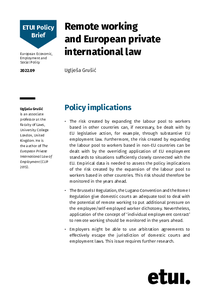Remote working and European private international law

European Trade Union Institute, Brussels
ETUI - Brussels
2022
8 p.
telework ; international law ; labour law ; EU law
ETUI Policy Brief. European Economic, Employment and Social Policy
2022.09
Law
English
Bibliogr.
2031-8782
"Policy implications
• The risk created by expanding the labour pool to workers based in other countries can, if necessary, be dealt with by EU legislative action, for example, through substantive EU employment law. Furthermore, the risk created by expanding the labour pool to workers based in non-EU countries can be dealt with by the overriding application of EU employment standards to situations sufficiently closely connected with the EU. Empirical data is needed to assess the policy implications of the risk created by the expansion of the labour pool to workers based in other countries. This risk should therefore be monitored in the years ahead.
• The Brussels I Regulation, the Lugano Convention and the Rome I Regulation give domestic courts an adequate tool to deal with the potential of remote working to put additional pressure on the employee/self-employed worker dichotomy. Nevertheless, application of the concept of ‘individual employment contract' to remote working should be monitored in the years ahead.
• Employers might be able to use arbitration agreements to effectively escape the jurisdiction of domestic courts and employment laws. This issue requires further research."
Digital
The ETUI is co-funded by the European Union. Views and opinions expressed are however those of the author(s) only and do not necessarily reflect those of the European Union or the ETUI.